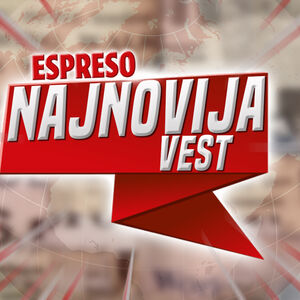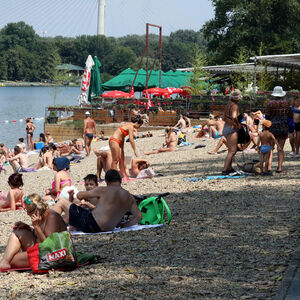US AMBASSADOR CHRISTOPHER HILL FOR KURIR TV: ‘Forming CSM most important! Serbs have right to know their future in Kosovo’

The Kurir Editorial Staff hosted the US Ambassador to Serbia Christopher Hill, at which time Hill gave an exclusive interview to Saša Dobrijević, the reporter of the morning show Redakcija (The Editorial Team). The main occasion was his views on how the negotiations between Belgrade and Priština are going and the other side’s playing a stalling game in implementing the Community of Serb Municipalities in the north of our province.
We keep listening to the politics regarding Kosovo and Metohija, and the Serbian general public knows everything about it. What is Washington’s position on the Community of Serb Municipalities?
“Ten years after the 2013 Brussels Agreement, the position of Washington and my opinion as well is that the Agreement should finally be implemented. We hope that proposals will be on the agenda in the coming weeks. Mr Lajčák, who has a great responsibility, will ensure that this process makes headway.”
Does this mean that there are guarantees that the Government of so-called Kosovo will fulfil their obligation to form the Community of Serb Municipalities?
“Well, the guarantees lie in the process itself. The Government of Kosovo has agreed to take part in this process, their leaders have shown to Mr Lajčák, the European Union, as well as the United States, that this will certainly happen and that they will deal with the problems pointed out to them by the European Union as well. The most important thing is forming the Community of Serb Municipalities. Overall, this includes not too many people. We are not talking about large numbers here, we are talking about Serbs from Kosovo who need to know what their future is going to be, what their rights are, what their responsibilities are, and who want to be able to live in peace. Forming the Community of Serb Municipalities is a very good idea. Looking back at 2013, I would say that now it is an even better idea.”
Why did we wait for so long for all of this?
“You will have to ask the people who were here before because I have only been here a year. But yes, I think that all of us observing it are wondering why it was not done earlier. Many people say that what is needed is the pressure to get it done but, in my opinion, the most important thing is what is best for everyone, and the best for everyone is to have a clear situation, for Serbs who have lived in Kosovo so many years to know what their future is. They should know what their relations with Priština are, but also with Belgrade. I think it’s time to set everything in motion. Historians can talk about why it has not been done so far, but we, who are facing it all in the present time and looking to the future, want it completed.”
Elections will be held on Sunday in the north of Kosovo and Metohija. What does the international community say regarding this and what is expected from the elections?
“Not many of us have said anything about it. The elections will be held on Sunday, and I am sure that there will be many doubts. Look, I think it is clear that this isn’t a good time for elections after all. The Serbs have left the institutions because of the failure to form the Community of Serb Municipalities. So it is clear that there will be problems. I believe there will be problems because of the level of participation. I think it is important to solve these other problems, and then we will see what else needs to be done.”
In the past few months and years, everyone has been talking about the problem – the relations between Belgrade and Priština – but no one talks about what will be happening when the relations between Belgrade and Priština are normalized. The first question is if that is the point where Serbia gets a “ticket” to enter the European Union and what is the next move. How will things develop beyond this point?
“The European Union is primarily interested in the enlargement. I realize that this has been paused in the previous years, but I think that it is pretty clear that the European Union has certain responsibilities for the countries in Europe which wish to be member states. I think that Europe has a great interest in the enlargement, especially regarding Serbia, but I think that the European Union has a right to be concerned about welcoming in new member states which bring along problems with their neighbours. So, the European Union would like to see a pattern of cooperation. It would like to see countries that get along well with their neighbouring countries. In this respect, the United States and other countries have solid proposals for the Open Balkans because it is a process that creates a situation where neighbouring countries cooperate. We already have an example of the excellent cooperation between Serbia and Albania, as well as the Republic of North Macedonia. I was recently in Albania at a conference, listening to their officials talking about the values of the Open Balkans and what they could get from the Open Balkans, such as Serbian tourists coming to Albania, import and export of fruit and vegetables, etc. Those are the things we want to see more of. Also, from the standpoint of the European Union, they want to see a pattern, normal trading behaviour, so to speak, and that must be done. This entire process must be implemented in the region. Making sure that these countries are more ready for European Union membership.”

A few days ago I saw a documentary by a young artist from Albania who lives in Belgrade. It was very interesting. Four or five people from Belgrade visit Priština for the first time, and a few people from Priština also visit Belgrade. Both were surprised by the hospitality. It was interesting because there is always talk of hatred in the media and the public. How can you create a relationship to ensure more peace between the two cultures? What would be the best solution?
“I think that is the greatest challenge in the region. The challenge is to channel the emotions towards what is necessary to build the economy, to ensure that young people stay, to secure good prospects for their future. Young people want a good future for their children. It is necessary to focus much more on this. History should be left to the historians, and it is also necessary to leave hatred to negative people. People want to dedicate to themselves and live their lives, be positive, and think about the future. You see, I wasn’t born yesterday, and this isn’t advice that everyone will take. When I talk to people in Belgrade or in other places, I have grown tired of how much people complain. I think it is time to take a step forward and consider what needs to be done. I want to see an image of an American business that is interested in Serbia. They are mostly interested for one single reason. They see good people wo want to work at their companies. This is mostly the sphere of interest of young people. That is why young people shouldn’t talk about history, but about their own development and similar things.”
How hard is your job actually at times like these?
“I think there are worse jobs in the world, so I’m not complaining. This is a great opportunity for me personally to come back to the Balkans. The Balkans have stability and should try to see if it is possible to get the efforts of the previous generations and previous years to happy and stable conclusions. The last time I was in this region, I didn’t see that. I can see clearly that Serbia is moving towards the West. Perhaps not everybody gets the same impression, but Serbia aspires to the West. When children know it, then everyone knows it. It is always a difficult process. You know when to make a move, what you carry with you, what you pack in the suitcase, and what you leave behind. It is very clear that Serbia is moving and going in the right direction, and I would like to be of help on that path.”

Let us go back to the moments of pressure on Serbia. We have talked about the problems regarding Kosovo and Metohija, but there is another kind of pressure that is placed on Serbia – not imposing sanctions against Russia. Can Serbia expect more pressure because it has not imposed these sanctions?
“It all depends on the Serbian Government. The European Union demands a lot from its member states and future members. The European Union had a pretty thin process, solely trade-related, and then it went deeper and deeper as you move through the history of the Union. Now there are expectations that European Union member states should agree on the security and foreign policy. Of course there are expectations that Serbia aligns its foreign policy. One of the biggest tests is the imposing of sanctions against Russia. The very word ‘sanctions’ in Serbia is an unpleasant topic because Serbia itself went through that in the 1990s, and the sanctions were quite heavy. I understand that the instinct of many Serbs says, ‘Now that we have gone through those heavy sanctions, we won’t impose them on others.’ It is a difficult problem. I think it is necessary for everyone to stop and understand that many countries have imposed these sanctions. Many countries which are smaller than Serbia, even those which have less influence on how Russia behaves. I have to say that in my entire life I have never seen a situation like Russia’s aggression against its neighbour. It is simply deplorable. So, there are many countries which know that their sanctions cannot have a direct impact, but they have to do the right thing. Many of these countries demand that Serbia do the right thing. Incidentally, I know that it is hard, but Russia isn’t helping your country at all, and Serbia must do what is necessary and move in the direction that is necessary to arrive where it wants to be.”
A few weeks ago I did an interview with a retired Ukrainian colonel, and he said that these sanctions are very effective. What is your opinion on this, given that there have been so many sanction packages?
“That’s right. I think there have been nine sanction packages. I’m not sure if I’m right because many EU sanctions have been implemented. It is clear that Russia is facing problems waging this war. You know, the Russians thought they would simply crush Ukraine, and of course this didn’t happen, and it won’t happen because I think everyone understands, especially in the West, that Russia must not be allowed to prevail. I often hear people saying, ‘Russia will never give up.’ Well, you know the United States are in unison like never before, in order to make sure that this will work. The sanctions have clearly damaged Russia and its capacity to obtain more arms technology. I think we will see more of this in the future. Russia must understand what they want to do after this war. It all seems like they have gone far into the woods and won’t talk to anyone. They pretend to have relations with countries in other parts of the world, but Russia ultimately needs much better relations with its neighbours and the North Atlantic Alliance, and it must make the decision to stop doing what it has been doing so far. It is clear that Mr Putin hasn’t made that decision, but he must understand – we will stand by Ukraine for as long as it is necessary.”
The US has helped Ukraine with weapons, but what is happening with other things? One day these people should return to their country and rebuild its infrastructure. Can the US help in this reconstruction as well?
“It sure can. One of the reasons for the problems with the enlargement of the European Union in order to take over this role in the previous months and, generally, in the past two years is the understanding that something needs to be done to help Ukraine rebuild itself. Just look at the Russian way of waging the war. It is essentially an attack against the civilians. That has caused a lot of damage for the civilian facilities, the economy, the social life, and other things in Ukraine. I think it needs to be understood that the United States and other countries will not only stand by Ukraine during this horrific war, but they will also stand by Ukraine when it starts the difficult process of recovery. We have done it before. Everyone knows what the Marshall Plan was. The plan came after a horrific war. We stood by Europe, and we helped it rebuild itself… The Europeans certainly did a lot, I wouldn’t want to imply that it was a US project. I think we all understand that all wars end, and then the question is how to build peace.”

When we look back on history, the relations between Serbia and the US were very friendly. I have to mention Operation Halyard, when Serbian soldiers saved US pilots. Nonetheless, after the NATO bombing, these relations deteriorated. Can they be brought back to their previous level?
“I do believe we can do it. I know that was a difficult period, and I am aware of the gravity of it all. I have been trying to draft a statement about it and say sincerely to people – look, we understand, but I also think that we need to move forward, and I feel that we have a basis for moving forward. It is not just that we have had quite good relations in the past 141 years, but also that we have plenty in common – not only basketball, but also doing many things together. I really think that we have the opportunity and the adjustment. This adjustment is very important in many respects. It is important in the post-war reconstruction, but it is also important for the relations. I have no doubt that the relations between Serbia and the US have a potential to grow further, not only like the pre-1990s relations, but to develop into something truly special. After all, that is how I see my mission here.”
Since you have mentioned basketball, this year marks the 100th anniversary of William Wyland, a Red Cross emissary from the US, bringing basketball to Serbia. The relationship between the US and Serbia through this sport represents a unique connection that other countries do not have. Serbian viewers wait for games at night. Can this feeling of connection arise in other domains as well?
“We are absolutely trying to do something about that and are making efforts to ensure everyone knows it. This 100th anniversary of basketball in Serbia is one of the key elements for things that we have in common. I still have a basketball hoop at home and practice shooting hoops. I’m not as tall as people here, but I’ve been working on my skills. You know, basketball was invented in the US, and we can take the credit for that. We cannot take the credit for many innovations, but we can for basketball. Serbia is one of the first countries to embrace that sport. So, that’s another thing that we should work together on.”

Would it be inconsiderate of me to ask you who is your favourite Serbian basketball player?
“You know, I used to live in Denver. Nikola Jokić is there, and I like to watch him play. He is such a tall guy. His ability to somehow see the game clearly seems like he has a computer that knows what will happen in the next ten seconds. It’s a pleasure to watch him. A few days ago I watched the Mavericks play, and that guy Luka Dončić is great, so I can’t decide. I wish I could shoot the hoops better.”
Good luck with that! Thank you, Your Excellency, I am very grateful to you for setting aside the time for this interview.
“It’s been a pleasure, and I wish to congratulate Kurir for everything it has done recently. You are young in business, but I like all these different platforms through which you attract the viewers and audiences. Congratulations, just keep up the good work.”
Kurir.rs/Saša Dobrijević
















































UBEDLJIVA POBEDA U ZAJEČARU, U KOSJERIĆU TESNO ALI I TU POBEDA Vučić: Narod rekao ne damo Srbiju! 7 meseci razaranja i ništa! Rezultat iz Zaječara im hladan tuš